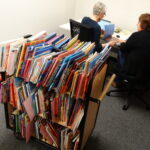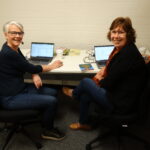Celebrating Diversity: The Importance of Representing Aboriginal and Torres Strait Islander peoples in Children’s Literature
In the world of children’s literature, representation matters. It shapes young minds, influences perceptions, and fosters empathy and understanding. However, for far too long, the voices and experiences of Aboriginal and Torres Strait Islander peoples have been ignored or misrepresented in books aimed at young readers. This is why we embarked on a research project to investigate the representation of Aboriginal and Torres Strait Islander peoples in both historic and contemporary children’s books.
 The significance of this project cannot be overstated. Children’s literature serves as a powerful tool for education and socialisation, shaping how children perceive themselves and others. When Aboriginal and Torres Strait Islander peoples are portrayed inaccurately or absent altogether, it perpetuates harmful stereotypes and reinforces a Eurocentric worldview that Australia was Terra Nullius. For many years the cannon of literature available to children has reflected inaccurate and harmful representations and messages about Aboriginal and Torres Strait Islander peoples, which has mirrored into education curriculum, resources and practice. By examining the representation of Aboriginal and Torres Strait Islander peoples in children’s books, we are confident our project will shed light on the issues of representation, contribute to decolonising the literary landscape, and advocate for more authentic and diverse storytelling.
The significance of this project cannot be overstated. Children’s literature serves as a powerful tool for education and socialisation, shaping how children perceive themselves and others. When Aboriginal and Torres Strait Islander peoples are portrayed inaccurately or absent altogether, it perpetuates harmful stereotypes and reinforces a Eurocentric worldview that Australia was Terra Nullius. For many years the cannon of literature available to children has reflected inaccurate and harmful representations and messages about Aboriginal and Torres Strait Islander peoples, which has mirrored into education curriculum, resources and practice. By examining the representation of Aboriginal and Torres Strait Islander peoples in children’s books, we are confident our project will shed light on the issues of representation, contribute to decolonising the literary landscape, and advocate for more authentic and diverse storytelling.
As part of our research journey, we were generously hosted at the National Centre for Australian Children’s Literature (NCACL), a treasure trove of resources dedicated to preserving, documenting and promoting Australian children’s literature. In recent years NCACL has developed its Aboriginal and Torres Strait Islander Resource, an expanding and thoughtfully curated searchable database of literature authored by and showcasing the rich diversity of Aboriginal and Torres Strait Islander peoples and their stories. Additionally, we also had the opportunity to access these books in the resource, along with other historical books, to support our research.
This experience gave us the opportunity to explore a rich collection of books by and about Aboriginal and Torres Strait Islander peoples, spanning different genres, time periods, and perspectives, viewpoints and worldviews. The centre’s collection not only provided valuable insights into historical portrayals of Aboriginal and Torres Strait Islander peoples in children’s literature, but also showcased contemporary works that celebrate culture, traditions, contributions to society and the deep connection to Country.
The resources of the National Centre for Australian Children’s Literature have been invaluable to our work as has the dedicated support of Belle Alderman and her amazing team of volunteers.
While our project is still underway, our emerging findings underscore the importance of the voices of Aboriginal and Torres Strait Islander peoples being heard and seen in children’s books. It is imperative to authentically and respectfully represent Aboriginal and Torres Strait Islander peoples in children’s literature. By examining historical and contemporary portrayals and leveraging the resources of institutions like the National Centre for Children’s Literature, we can work towards creating a literary landscape that celebrates diversity, fosters empathy, and empowers young readers to embrace their identities and appreciate the richness of Indigenous cultures.
 Dr Helen Adam (left) is Course Coordinator for the Master of Teaching (Primary) in the School of Education at Edith Cowan University. Helen believes to achieve equitable outcomes we need to challenge systemic inequities and support educators as they work for better futures for young Australians. Helen advocates for research to investigate culturally responsive use of authentically diverse and inclusive literature as one vehicle to break down barriers of prejudice and misunderstanding and contribute to equitable.
Dr Helen Adam (left) is Course Coordinator for the Master of Teaching (Primary) in the School of Education at Edith Cowan University. Helen believes to achieve equitable outcomes we need to challenge systemic inequities and support educators as they work for better futures for young Australians. Helen advocates for research to investigate culturally responsive use of authentically diverse and inclusive literature as one vehicle to break down barriers of prejudice and misunderstanding and contribute to equitable.
Dr Libby Jackson-Barrett (Right) is Associate Dean, Senior Researcher for Kurongkurl Katitjin, Centre for Indigenous Australian Education and Research and the School of Education at Edith Cowan University. As an interdisciplinary scholar Libby’s research interests and teachings include exploring factors that promote students understanding of Country with a particular interest in culturally responsive pedagogy in Initial Teacher Education.
See also:
Reviews and media coverage for the Aboriginal and or Torres Strait Islander Resource – NCACL
A printable document about the background to the creation of the Aboriginal and or Torres Strait Islander resource is available here.
Featured image: We Are Australians – NCACL
Posted by: NCACL | Published: 01 Apr 2024

0 Comments
There are currently no comments, be the first to leave one